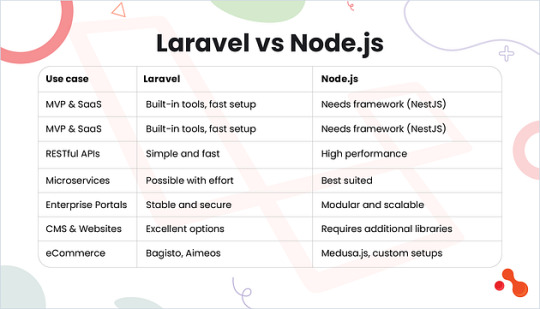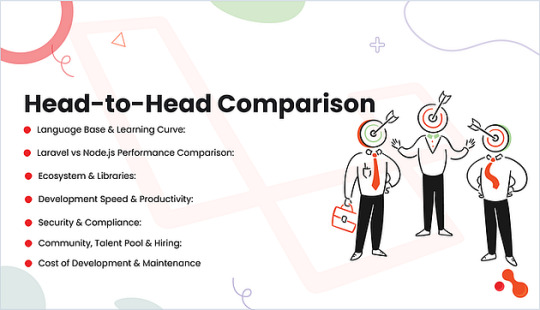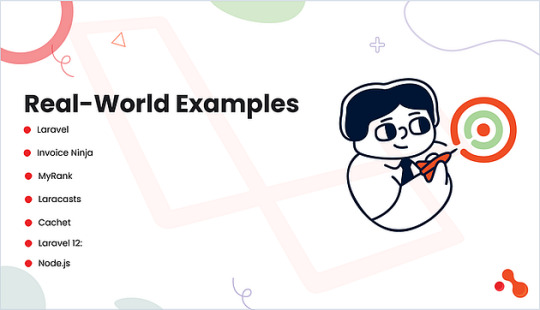#Hire A Backend Developer
Explore tagged Tumblr posts
Text
Why Hire a Backend Developer for Your Business?

In today's rapidly evolving digital landscape, businesses must invest in robust, scalable, and high-performance websites and applications to stay competitive. While front-end development often steals the spotlight, backend development is equally, if not more, important. The backend of an application is responsible for powering its functionality, handling data management, security, and ensuring smooth interactions between the server, database, and user interface. This is where a skilled backend developer becomes an invaluable asset.
If you're wondering Why Hire a Backend Developer for Your Business, the answer lies in the critical role they play in ensuring your business operations are efficient, secure, and scalable. Let’s explore the many reasons why hiring a backend developer can benefit your business.
1. Scalable and Efficient Application Development
When you hire a backend developer, you are securing a professional who specializes in designing and developing scalable systems. Backend developers build the foundation that ensures your application can handle increased traffic and data demands as your business grows. They understand how to optimize server performance, manage large datasets, and ensure that your application can scale smoothly without crashing or slowing down.
A backend developer uses various technologies, databases, and frameworks to ensure the backend can handle both current and future traffic demands, allowing for growth without compromising performance.
2. Security and Data Protection
One of the primary responsibilities of a backend developer is ensuring the security of your application and its data. As cyber threats continue to evolve, businesses need to prioritize data protection, especially when dealing with sensitive customer information. A backend developer for hire has the expertise to implement secure authentication systems, encryption, and other security protocols that safeguard user data and protect your business from potential breaches.
Hiring a dedicated backend developer ensures that security vulnerabilities are identified and mitigated before they become a problem. Whether it's implementing secure APIs, ensuring data encryption, or conducting regular security audits, your business's backend will be in good hands.
3. Streamlined Database Management
Efficient data management is the backbone of any application. A backend developer specializes in working with databases and designing systems that store, retrieve, and manage your business's data effectively. From ensuring smooth integration with third-party services to designing complex database queries and managing large datasets, a backend developer is crucial in maintaining a seamless data flow throughout your application.
By hiring a backend developer, you get an expert who can optimize database queries, minimize response times, and ensure the overall performance of the database is efficient, allowing for faster application response times.
4. Integration of Third-Party Services
In today’s interconnected world, businesses often need to integrate third-party services into their applications, such as payment gateways, CRM tools, social media platforms, and more. A backend developer is skilled in handling these integrations, ensuring that all third-party services work seamlessly with your application. This integration is essential for enhancing functionality and improving the user experience.
A backend developer will handle the complexities of integrating APIs and third-party tools, allowing your business to offer users a smoother, more cohesive experience across platforms.
5. Optimizing Application Performance
The backend of an application plays a key role in ensuring that it runs efficiently. A skilled backend developer knows how to write optimized code that reduces latency, minimizes downtime, and enhances the overall performance of the application. They can optimize database queries, streamline server-side processes, and handle application load balancing, which results in a faster and more responsive app for your users.
When you hire a backend developer, they’ll ensure your app or website doesn’t suffer from slow load times or inefficient operations, which can lead to customer dissatisfaction and loss of business.
6. Cost-Effective Development
While hiring a backend developer might seem like an added cost, it is actually a wise long-term investment. By hiring a backend developer for your business, you’re ensuring that your application’s backend is built with the right infrastructure from the start. This helps prevent future issues, costly fixes, and performance bottlenecks that could arise from poor backend architecture.
Hiring dedicated backend developers also allows you to avoid the costly process of hiring and training in-house developers. Whether you hire a remote backend developer or a dedicated team, you can find flexible, cost-effective solutions that meet your needs.
7. Focus on Core Business Functions
By hiring a backend developer, you free up your time to focus on other critical aspects of your business, such as marketing, customer relations, and strategic planning. Backend developers are highly skilled professionals who can take on the complex tasks related to application architecture, database management, and server-side coding, allowing your team to focus on its core objectives.
This delegation leads to increased productivity and ensures that all technical aspects of your app or website are handled by experts, giving you peace of mind.
8. Seamless User Experience
The backend developer plays a crucial role in the user experience (UX) of your application. Even though users interact primarily with the front-end interface, the backend powers the functionality behind the scenes. A well-structured backend ensures smooth data retrieval, faster page loads, and a more responsive app.
When you hire backend developers for hire, they ensure that the backend logic is aligned with the front-end requirements, ultimately providing users with a seamless and enjoyable experience.
Conclusion
The role of a backend developer is critical to the success of any application. From ensuring scalability and security to streamlining performance and optimizing database management, backend developers are the backbone of any well-functioning application. If you're looking to build a robust, secure, and high-performance app or website, hiring a backend developer is an investment that will pay off in the long run. Hiring a dedicated backend developer allows your business to benefit from expert knowledge, cost-effective development, and a secure, scalable solution that grows with your needs. Whether you choose to hire a remote backend developer or a full-time team, you’re ensuring your business gets the technical expertise needed to thrive in today’s digital landscape. IIH Global offers expert backend development services to help you build scalable and secure applications.
If you're looking to enhance your digital presence, contact us today to hire backend developers who can take your business to the next level!
Reposted Blog Post URL: https://alenamage.livepositively.com/why-hire-a-backend-developer-for-your-business/
#Hire Backend Developer#Backend Developer For Hire#Hire A Backend Developer#Hire Dedicated Backend Developer#Hire Remote Backend Developer
0 notes
Text
People here might be interested in the fact that https://fichub.net/ can now download stories from mcstories.com, as epub, pdf , or other formats
Why am I telling you? Because I wrote mcstories adapter that does it. It's my first (non-trivial) accepted open source PR.
And I can't brag about it on platforms where my family follows me, because then I'd have to tell them I like mind control porn.
This it probably the most work I have ever done to avoid 10 minutes of pressing ctrl-c and ctrl-v (edited)
#mcstories#fanfic#open source#mind control kink#fichub#I only had time to finish it because I got laid off#anyone hiring python backend developers?
7 notes
·
View notes
Text
Interview Questions to Ask When Hiring a .NET Developer

The success of your enterprise or web apps can be significantly impacted by your choice of .NET developer. Making the correct decision during interviews is crucial because .NET is a powerful framework that is utilized in a variety of industries, including finance and e-commerce. Dot Net engineers that are not only familiar with the framework but also have the ability to precisely and clearly apply it to real-world business problems are sought after by many software businesses.
These essential questions will assist you in evaluating candidates' technical proficiency, coding style, and compatibility with your development team as you get ready to interview them for your upcoming project.
Assessing Technical Skills, Experience, and Real-World Problem Solving
What experience do you have with the .NET ecosystem?
To find out how well the candidate understands .NET Core, ASP.NET MVC, Web API, and associated tools, start with a general question. Seek answers that discuss actual projects and real-world applications rather than only theory.
Follow-up: What version of .NET are you using right now, and how do you manage updates in real-world settings?
Experience with more recent versions, such as .NET 6 or .NET 8, can result in fewer compatibility problems and improved performance when hiring Dot Net developers.
How do you manage dependency injection in .NET applications?
One essential component of the scalable .NET design is dependency injection. An excellent applicant will discuss built-in frameworks, how they register services, and how they enhance modularity and testability.
Can you explain the difference between synchronous and asynchronous programming in .NET?
Performance is enhanced by asynchronous programming, particularly in microservices and backend APIs. Seek a concise description and examples that make use of Task, ConfigureAwait, or async/await.
Advice: When hiring backend developers, candidates who are aware of async patterns are more likely to create apps that are more efficient.
What tools do you use for debugging and performance monitoring?
Skilled developers know how to optimize code in addition to writing it. Check for references to Postman, Application Insights, Visual Studio tools, or profiling tools such as dotTrace.
This demonstrates the developer's capacity to manage problems with live production and optimize performance.
How do you write unit and integration tests for your .NET applications?
Enterprise apps require testing. A trustworthy developer should be knowledgeable about test coverage, mocking frameworks, and tools like xUnit, NUnit, or MSTest.
Hiring engineers with strong testing practices helps tech organizations avoid expensive errors later on when delivering goods on short notice.
Describe a time you optimized a poorly performing .NET application.
This practical question evaluates communication and problem-solving abilities. Seek solutions that involve database query optimization, code modification, or profiling.
Are you familiar with cloud deployment for .NET apps?
Now that a lot of apps are hosted on AWS or Azure, find out how they handle cloud environments. Seek expertise in CI/CD pipelines, containers, or Azure App Services.
This is particularly crucial if you want to work with Dot Net developers to create scalable, long-term solutions.
Final Thoughts
You may learn more about a developer's thought process, problem-solving techniques, and ability to operate under pressure via a well-structured interview. These questions provide a useful method to confidently assess applicants if you intend to hire Dot Net developers for intricate or high-volume projects.
The ideal .NET hire for expanding tech organizations does more than just write code; they create the framework around which your products are built.
2 notes
·
View notes
Text
Laravel vs Node.js: Which One is Good?
Choosing between Laravel and Node.js for your next web project? Find out which backend framework best fits your development goals.
Introduction

Startups tend to aim for rapid market entry while large enterprises look to build a scalable system. Irrespective of which you are, the main dilemma before starting developing state-of-the-art solutions will be the selection of technology.
There are several options, but which is the best backend framework for startups and enterprises? In most cases, it tends to come down to the two most influential frameworks — Laravel and Node.js.
This isn’t an article to compare programming languages however, it is important to understand how PHP vs JavaScript backend fair. 74.2% of the websites use PHP for server-side programming and Laravel happens to be one of the most popular PHP frameworks.
Laravel is a PHP-based framework that has built a reputation for rapid development and simplicity. On the other hand, Node.js, powered by JavaScript, is hailed for its performance, scalability, and event-driven architecture.
Deciding between Laravel and Node.js isn’t merely a technical preference; it’s a strategic business decision. The goodness of each platform lies in its ability to meet your project’s unique demands, budget constraints, and scalability aspirations, directly influencing your real-world ROI.
While both technologies are powerful in their own right, they serve different purposes and cater to different use cases. This is an article about Laravel vs Node.js — a side-by-side comparison to evaluate them across several critical factors.
Quick Overview of Laravel

Laravel is more than just a PHP framework; it represents the modern face of PHP development. Laravel is a robust, open-source PHP framework built around the Model-View-Controller (MVC) architecture. It provides built-in tools such as Eloquent ORM, Blade templating, authentication scaffolding, and Artisan CLI to simplify development workflows.
Hence the obvious question: Is Laravel better than Node.js for web development?. The following sections will make this more evident.
There are many Laravel pros and cons, but here are it’s core philosophy and strengths:
Developer Experience (DX) First
Model-View-Controller (MVC) Architecture
Feature-rich out-of-the-box
Eloquent ORM
Blade Templating Engine
Artisan CLI
Built-in Authentication & Authorization
Caching & Queues
Testing Utilities
Maturity and Stability
Vibrant and Supportive Ecosystem
Laravel applications scale effectively
There are many benefits of using Laravel since it is a feature-rich platform with built-in security. It is ideal to build high-performing applications.
Understanding What is Node.js

Developers use Node.js not as a framework, but as a runtime environment for JavaScript powered by Chrome’s V8 engine. Its breakthrough came when it allowed JavaScript to move beyond the browser, letting teams build both frontend and backend with one language.
By operating on an event-driven, non-blocking I/O model, Node.js handles real-time data and high volumes of simultaneous connections with impressive efficiency.
There are many benefits of using Node.js, however here are its core strengths:
Asynchronous, Non-Blocking I/O
NPM (Node Package Manager) Ecosystem
Ideal for APIs and Microservices
Real-Time Capabilities
Serverless Potential
Node.js performance advantages in several use cases can work in your favor.
Popular Node.js Frameworks That Bring Structure to the Chaos
Although Node.js itself isn’t a framework, it uses the JavaScript programming language. There are several JavaScript frameworks that allow one to build a full-fledged application. Here are a few standout choices that have become favorites in the community:
Express.js: Think of Express as the lean, no-frills framework that gets out of your way. It doesn’t tell you how to build — just hands you the tools and lets you run with them. Loved for its simplicity and flexibility, Express powers everything from small side projects to large-scale applications.
NestJS: If you’re building something complex and want structure from day one, NestJS steps in like an architect with a blueprint. Inspired by Angular and built with TypeScript at its core, it brings dependency injection, modular design, and enterprise-ready features that help teams stay organized as projects grow.
Koa.js: Created by the same team behind Express, Koa is the modern minimalist. It uses ES6’s async/await to give developers finer control over asynchronous flows, cutting down on callback clutter and improving code readability. It’s perfect for those who want the power of Node with a cleaner, more elegant approach.
Use Case Comparisons
Choosing backend technology is a task for someone with sufficient technical knowledge. It is an important decision that can dictate the outcome of your project.
This Laravel vs Node.js overview of the user cases will make this decision easier. Laravel is a full-stack PHP framework that is ideal for the rapid development of secure, high-performing, and scalable applications. This makes it ideal for developing enterprise applications, content-driven platforms, eCommerce applications, SaaS solutions, and much more.
NodeJS is a JavaScript runtime library with immense potential. It is well suited for developing real-time, event-driven, and high-concurrency applications. This means it is one of the best options when it comes to developing a chat application, messaging app, single page application, and IoT application. Hence it is vital to consider Node.JS when doing a backend technology comparison with use cases.
Laravel vs Node.js — compassion of the use cases:

Here are some of the best use cases for Laravel:
On-demand apps
eLearning apps
Stock trading solutions
Multilingual CMS system
Banking & Fintech apps
Gaming apps
Music & Video streaming apps
Chat, Messaging, and Email apps
Here are some of the best use cases for Node.js:
Real-time chat apps
Complex SPAs
Embedded systems
Data streaming apps
Transportation and logistic apps
Browser games
Head-to-Head Comparison

Head-to-Head Comparison
The previous sections give a good overview of both Laravel and Node.js. Hence it is time for a detailed comparison of Laravel vs Node.js:
Language Base & Learning Curve:
Laravel: Laravel’s opinionated structure and extensive documentation make it beginner-friendly and ideal for teams needing quick onboarding. However, it does require one to have intermediate experience with programming in PHP. Laravel’s gentle learning curve is a major plus for fast-moving teams.
Node.js: Node.js enables full-stack development with a single language — JavaScript However, developers must grasp asynchronous patterns, which can steepen the learning curve. Good knowledge of JavaScript, and a good understanding of the Node’s architecture and NPM package modules can help reduce the learning curve. Node.js offers flexibility but demands discipline and experienced developers to maintain structure.
Laravel vs Node.js Performance Comparison:
Laravel: Laravel, built on a synchronous PHP runtime, may lag in high-concurrency use cases. However, performance bottlenecks can be addressed with Laravel Octane, Swoole, or RoadRunner for asynchronous handling. Laravel works well for high-logic business applications that aren’t real-time intensive.
Node.js: Node.js’s non-blocking architecture supports concurrency, making it perfect for I/O-heavy tasks like chat apps, live data feeds, and APIs. It scales horizontally with ease and performs exceptionally in high-traffic conditions. Node.js handles real-time, scalable applications efficiently. Hence Node.js scalability is an advantage.
Ecosystem & Libraries:
Laravel: Laravel boasts an integrated ecosystem. Tools like Horizon (queues), Echo (broadcasting), and Scout (search) provide robust features without relying on third-party libraries. Thus, Laravel reduces time-to-market with integrated tools.
Node.js: npm offers a vast number of packages for almost every functionality. However, it’s more unstructured and can lead to fragmented architecture if not managed properly. Node.js offers extensive flexibility for large-scale, microservice-driven systems.
Development Speed & Productivity:
Laravel: Laravel is designed for rapid application development. Features like built-in auth, migrations and elegant routing simplify repetitive tasks. It’s great for building SaaS products, internal tools, and CMS platforms. Laravel is better suited for MVPs and fast iteration cycles.
Node.js: While Node.js offers flexibility, setting up projects can take more time. Frameworks like NestJS or Express can streamline development but still require configuration and boilerplate. Node.js allows for customizable architecture suited for complex business needs.
Security & Compliance:
Laravel: Laravel comes equipped with built-in protection against common web threats like CSRF, XSS, and SQL injection. It also provides password hashing, authentication, and user session handling out of the box. Laravel offers stronger defaults. Node.js requires thorough DevSecOps policies. Laravel security practices work in your favor.
Node.js: Node.js security measures depend heavily on chosen libraries. Tools like Helmet and CSURF offer protection, but developers must be proactive in applying security best practices.
Community, Talent Pool & Hiring:
Laravel: Laravel has a strong presence in South Asia, Eastern Europe, and Latin America. Developers are widely available and often more cost-effective. Laravel-focused agencies and marketplaces also exist. Laravel is budget-friendly and widely supported.
Node.js: JavaScript’s popularity makes Node.js developers easy to find. Full-stack JavaScript developers are in high demand, especially in North America and Europe. Node.js has a larger, more versatile talent pool.
Cost of Development & Maintenance
Laravel: Development with Laravel is cost-effective due to faster development cycles and a large pool of affordable developers. Its structured nature also ensures lower maintenance overhead. The cost to develop Laravel apps makes it ideal for short-time-to-market goals.
Node.js: Initial development may cost more due to complex setups. However, the cost to develop Node.js app can be lower for large-scale deployments if maintained well. Node.js offers better long-term scalability for high-performance apps.
Startups & Enterprises
Laravel: Laravel is the ideal choice for startups seeking to build and ship fast. The Laravel ecosystem and built-in tools help reduce development time and costs. Laravel remains a strong contender for enterprise-grade CRUD applications, compliance platforms, and ERP systems.
Node.js: Node.js should be considered when real-time or data-heavy applications are involved. Node.js is excellent for scalable microservices and real-time systems but demands robust DevOps and architecture oversight.
Communication:
Laravel: Laravel is designed with a well-defined structure that promotes good coding practices. At the same time, it also equips the developers with high-level control and lets them experiment. This makes Laravel highly customizable however, it requires one to have extensive knowledge of PHP in order to do so.
Node.js: Node.js is also open-source thus allowing one to customize the package modules. It allows the developers to customize as per their requirements.
Laravel vs Node.js Feature Comparison
When choosing between Laravel and Node.js, it’s not just about the language — it’s about philosophy, structure, and how each tool helps you deliver better software faster. Let’s explore how these two powerhouses stack up, feature by feature.
The Laravel vs Node.js feature-by-feature breakdown:
Laravel: Elegance Meets Efficiency
Laravel isn’t just another PHP framework — it’s a carefully crafted ecosystem designed to make your life easier as a developer. It emphasizes clarity, structure, and developer happiness, and it comes packed with features that reduce the need for boilerplate code and repetitive tasks.
MVC Architecture That Keeps You Organized
Laravel’s Model-View-Controller (MVC) structure brings a clean separation of logic, data, and presentation. This design pattern keeps your application maintainable and scalable — even as your codebase grows.
Eloquent ORM: Talk to Your Database Like a Pro
Working with databases in Laravel feels almost natural. Eloquent lets you treat tables as objects and simplifies complex relationships with expressive syntax, making CRUD operations feel intuitive.
Queue System: Offload the Heavy Lifting
Whether you’re sending thousands of emails or processing massive image files, Laravel’s built-in queue system lets you push those time-consuming tasks to the background — speeding up the user experience without sacrificing performance.
Security, Baked In
From CSRF protection to hashed passwords and built-in sanitization, Laravel ships with robust security already wired into its core — saving you hours of research and implementation.
Routing That Makes Sense
Laravel’s elegant routing syntax helps define clear URL paths and lets you attach middleware (like authentication or logging) right at the entry point — so you control traffic before it hits your controllers.
First-Class Testing Support
Laravel promotes test-driven development (TDD) by offering built-in tools for unit, feature, and browser testing. If stability and continuous delivery matter to you, Laravel has your back.
Broadcasting & Real-Time Updates, Simplified
With Laravel Broadcasting and Echo, integrating real-time features like notifications or collaborative tools becomes seamless. No more complex WebSocket setups — just elegant APIs that work.
Laravel Octane: Performance on Steroids
Looking to push PHP beyond its limits? Octane uses high-performance servers like Swoole to dramatically boost Laravel’s speed. It brings concurrency, coroutines, and async behavior — something PHP wasn’t traditionally known for — right into your app stack.
Node.js: Powering Full-Stack JavaScript
Node.js isn’t a framework — it’s a runtime environment that redefined backend development by letting JavaScript run server-side. Lightweight, non-blocking, and asynchronous by design, Node.js is the engine behind many of today’s most demanding, real-time applications.
Asynchronous, Non-Blocking I/O for the Win
Node handles thousands of simultaneous connections with ease. Its event-driven nature makes it ideal for chat apps, live feeds, and APIs that demand real-time responsiveness.
Blazing Speed with V8 Engine
Powered by Google’s V8 engine, Node compiles JavaScript to machine code on the fly — giving your backend an impressive performance boost, especially for compute-light workloads.
Single-Threaded, Yet Super Scalable
Although it runs on a single thread, Node can handle massive traffic. For heavier, CPU-bound tasks, you can offload processing to worker threads or scale horizontally with ease.
NPM: The World’s Largest Developer Toolbox
With access to over a million open-source packages, NPM (Node Package Manager) makes it easy to plug in pre-built modules — whether you’re spinning up a REST API or adding OAuth support.
JavaScript All the Way Down
Using the same language across frontend and backend simplifies collaboration, reduces context switching, and makes it easier to hire or upskill developers in full-stack roles.
Perfect for Microservices and APIs
Node’s modular design and lightweight footprint make it a natural fit for building microservices architectures, allowing teams to scale and deploy independently without stepping on each other’s toes.
Real-Time Application Ready
Need WebSockets, live updates, or streaming capabilities? Node.js shines in building fast, two-way communication systems — whether it’s multiplayer gaming, collaborative tools, or financial dashboards.
Handles Streams Like a Native
From processing large video files to piping data through analytics engines, Node’s stream API allows you to work with big data efficiently, minimizing memory usage and boosting performance.
Runs Anywhere, Deploys Everywhere
With cross-platform support baked in, Node applications can be developed on macOS and deployed on Linux or Windows with minimal friction — an essential advantage for today’s cloud-native workflows.
Real-World Examples

Real-World Examples
In the fast-paced startup world, the ‘good’ technology choice — be it Laravel or Node.js — isn’t about absolute speed, but about strategic alignment. Your ability to scale effectively hinges on understanding when each platform truly serves your evolving needs, ensuring sustainable growth over time. Here are a few real-world examples of Laravel and Node.js to help with the decision process.
Laravel: Laravel is the choice of many different companies around the world. This includes firms like BBC, Pfizer, 9GAG, TourRadar, Novell, Inc. and many more. Here are a few case studies:
Invoice Ninja:
Industry: SaaS / Invoicing
Use Case: Online invoice creation, time tracking, payment integration
Why Laravel: Secure multi-tenant system, powerful API backend, seamless integration with payment gateways.
Tech Highlights: Laravel’s elegant syntax, queues, and mail support power a scalable solution.
Link: https://www.invoiceninja.com
MyRank:
Industry: EdTech
Use Case: Competitive exam preparation platform with quizzes, reports, and performance analytics.
Why Laravel: Easy routing, performance optimizations with caching, and support for complex backend logic.
Link: https://www.myrank.in
Laracasts:
Industry: Online education (Developer training)
Use Case: Streaming video platform for Laravel and general PHP training.
Why Laravel: Built by Jeffrey Way (a Laravel contributor), it uses Laravel’s routing, authentication, and custom services extensively.
Link: https://laracasts.com
Cachet:
Industry: DevOps / Infrastructure
Use Case: Open-source status page system.
Why Laravel: Quick development cycles, elegant RESTful structure, user-friendly admin dashboards.
Link: https://cachethq.io
OctoberCMS
Industry: CMS / Web Development
Use Case: Content management platform used by developers and agencies.
Why Laravel: Leverages Laravel’s MVC architecture, ORM, and plugin ecosystem.
Link: https://octobercms.com
Great Colorado Homes
Industry: Real Estate / Web Development
Use Case: Real estate portal for both property buyers and sellers with several additional features.
Why Laravel: Acquaint Softtech developed with Laravel to leverage the built-in features for a dynamic real estate listing, property tour, robust property listing & search, and high performing third-party integration.
Link: https://greatcoloradohomes.com/
Node.js: This is a popular framework trusted by many large firms worldwide. Some of the industry’s leading companies that implement Node.js include Twitter, Spotify, eBay, Airbnb, Walmart and many more. Here are a few strategically selected case studies:
LinkedIn (Mobile Backend):
Industry: Professional Networking
Use Case: Backend API for mobile apps
Why Node.js: Switched from Ruby on Rails to Node.js for 2–10x performance improvements and better mobile scaling.
Link: LinkedIn
Netflix:
Industry: Streaming / Entertainment
Use Case: Server-side rendering, UI customization layer
Why Node.js: Non-blocking I/O for real-time data, fast iteration cycles, and unified JS stack for frontend + backend.
Link: Netflix
PayPal:
Industry: FinTech / Payments
Use Case: Web application backend
Why Node.js: Switched from Java to Node.js, resulting in 2x faster response times and a unified dev team for browser/server logic.
Link: PayPal
Uber:
Industry: Ride-sharing
Use Case: Real-time data processing, dispatch system
Why Node.js: Asynchronous processing, event-driven architecture suited for high I/O throughput and fast iteration.
Link: Uber Engineering Blog
Trello:
Industry: Productivity / Project Management
Use Case: Real-time collaboration platform
Why Node.js: WebSockets and event-based architecture for updating project boards in real-time.
Link: Trello
SuperFi
Industry: Fintech / Web & Mobile App
Use Case: A debt solution platform for users to clear their bills and gain rewards.
Why Node.js: Acquaint Softtech chose Node.js to streamline banking access, integrate payments and financial data, and offer users highly robust real-time chat support.
Link: https://www.joinsuperfi.com/
The Verdict
Contacting the professionals for expert Laravel or Node.js consultation can help businesses decide which one is best for them. NodeJS was created in 2009, uses the Google V8 JavaScript engine and has an event-driven non-blocking i/o. Laravel was created in 2011 and uses the Blade template engine and has multithreaded blocking i/o.
Choosing the right backend technology is not as straightforward as one would imagine. Here are a few facts on the latest versions of both Laravel and Node.js.
Laravel 12:
Introduces starter kits for React, Vue, and Livewire.
Provides variants of each starter kit powered by WorkOS AuthKit.
Refined and organized directory structure.
Upgraded security with stricter password policies and validation.
Implements asynchronous caching, smarter database queries, and rapid job processing.
Enhanced WebSocket support and improved real-time capabilities.
Advanced query creation, GraphQL support, and API versioning.
Strong community support.
Node 24.1.0:
V8 engine upgrade that unlocks several new JavaScript features providing performance improvements.
Adds the ability to pause threads in Atomics, aiding low-level concurrency tasks in Workers.
Ensures that AsyncLocalStore instances operate in isolation, enhancing the reliability of asynchronous operations.
Strong support via libraries like Socket.io and native WebSocket APIs
Flexible API development with support for REST, GraphQL, and various middleware options
Both Laravel 12 and Node.js 24.1.0 offer robust solutions for modern web development, and the choice between them should be guided by your project’s specific requirements, team expertise, and long-term maintenance considerations.
That said it is hard to ignore the following statistics:
Over 74.2% of the websites use PHP as the server-side programming language.
62.3% of developers worldwide use JavaScript while only 18.2% use PHP programming language. (2024).
Laravel is one of the most popular PHP frameworks with a 43.7% share.
40.8% of developers worldwide use Node.js as of 2024 and 7.9% use Laravel
2.32% of the top 1 Million websites use Laravel (23215)
4.84% of the top 1 million websites use Express.js (48423)
4.5% of all websites where the server-side language is known use Node.js.
Choose Laravel development services if you’re looking for a full-featured PHP framework with built-in tools for rapid development, enhanced security features, and a structured approach to building web applications. It is the ideal technology for startups with the need for rapid MVP development, standard web application, predictable development & talent acquisition.
Enterprises can hire Laravel developers like Acquaint Softtech for better options for robust monoliths & large enterprise applications, integration with existing PHP infrastructure, predictable development & onboarding for large teams, and professional support & ecosystem.
It is ideal for startups looking for real-time as a core feature, microservices architecture from day one, full-stack JavaScript team, and heavy API-driven products.
Node.js is for Enterprises that require high-performance APIs & microservices architecture, real-time & high concurrency demands, unified language strategy, cloud-native & serverless initiatives, and event-driven architectures. Acquaint Softtech offers backend development servicesfor NodeJS as well.
Hire backend developers depending on how the requirements of your startup or enterprise match with what Laravel and Node.js have to offer. Laravel provides a defined structure, guiding your project with convention. The truly good choice hinges on the level of architectural autonomy and complexity the development team you hire is best equipped to handle.
0 notes
Text
Multiminds Technology offers top Python development services tailored for startups and enterprises. Hire expert Python developers for scalable web and AI solutions. read more
#Python development services#Hire Python developers#Python web development company#Custom Python development#Python for machine learning#Python backend development#Django development services#Python software development company#Affordable Python developers India
0 notes
Text
Unlock Global Talent: How to Hire Dedicated Developers in India
The global tech landscape is evolving, and hire dedicated developers in India is an excellent strategy to access high-quality talent. India boasts a vast pool of experienced developers proficient in various technologies, ensuring you get the best solutions for your business needs. By hiring dedicated developers in India, you tap into a resource that offers both expertise and cost-effectiveness, allowing you to scale your project quickly without compromising quality. Whether it’s software, mobile apps, or web development, India is a hub for talented developers to help drive your business forward.
#hire dedicated developers india#hire dedicated developers in india#dedicated offshore developers#hire dedicated mobile developers#hire dedicated backend developers#hire a dedicated developer#hire team of developers#hire dedicated developer#hire dedicated programmers#hire dedicated developers#hire dedicated developer india#dedicated developer#offshore dedicated developers
0 notes
Text
Hire Expert Backend Developers
Jellyfish Technologies builds digital products and software. They offer many services like making software looking at data, working with clouds, updating old apps creating AI, and helping with DevOps. They've been around for more than 13 years and have 150+ experts on their team. So far, they've finished over 4000 projects. They work with different types of businesses such as healthcare, fintech, and retail, among others. People know Jellyfish Technologies for doing good work finishing projects on time, and keeping their clients happy. They come up with special solutions using the latest tech to help companies reach their digital goals.
Boost your business with robust backend solutions—hire backend developers from Jellyfish Technologies to build scalable, secure, and high-performance applications. Our experts specialize in API integration, database management, and server-side development, ensuring seamless functionality and operational efficiency for your digital products. Partner with us for innovation-driven backend development.
0 notes
Text
1 note
·
View note
Text
How to Choose the Right Tech Stack & Hire Affordable, HIPAA-Compliant Software Development Services in 2025
In today's digital landscape, choosing the right tech stack is crucial for building scalable, high- performance applications. Whether you're developing a web application, mobile app, enterprise solution, or AI-powered software, selecting the right combination of frontend, backend, database, and cloud technologies directly impacts performance, security, and user experience.

Additionally, businesses in the healthcare industry must comply with HIPAA regulations when handling sensitive patient data. APPSOLN TECHNOLOGY has extensive experience in developing HIPAA-compliant healthcare solutions, ensuring secure and regulatory-compliant software for hospitals, clinics, EMRs, and telemedicine platforms.
This guide will help you:
✔ Choose the right tech stack for your project
✔ Find cost-effective and high-quality software development services
✔ Ensure HIPAA compliance for healthcare software
What is a Tech Stack?
A tech stack is a combination of technologies, frameworks, and tools used to build a software application. It consists of:
✔ Frontend (UI/UX) – The client-side, user interface & experience
✔ Backend (Server-Side Logic & APIs) – The core business logic and data processing
✔ Database – Data storage and retrieval system
✔ Cloud & DevOps – Hosting, deployment, and scalability solutions
Selecting the right tech stack ensures scalability, security, and performance for your application.
Factors to Consider When Choosing a Tech Stack
Type of Application
✔ Web Applications → MERN, MEAN, .NET Core, LAMP
✔ Mobile Apps → Native (Swift/Kotlin) or Cross-Platform (React Native, Flutter)
✔ Enterprise Software → .NET Core, Java Spring Boot, Django
✔ HIPAA-Compliant Healthcare Apps → .NET Core + Azure, Django + AWS, Java Spring Boot
Scalability & Performance
If your application will handle high traffic or large data, choose:
✔ Scalable Options → .NET Core, Node.js, Java Spring Boot
✔ High-Performance → C++, Rust, ASP.NET Core
Security & Compliance
If your application deals with sensitive data, security is a top priority:
✔ Best for Security → .NET Core, Java, Django, Laravel
✔ Best for HIPAA Compliance → ASP.NET Core + Azure, Java + AWS
Developer Availability & Cost
✔ Easier to Hire Developers → JavaScript (React, Node.js), Python, Java, .NET
✔ More Specialized & Costly → Rust, C++, Ruby on Rails
Time to Market (Development Speed)
✔ Best for Rapid Development → Django, Ruby on Rails, Flutter, React Native
Best Tech Stacks for 2025
Best Web Development Stacks
Tech StackBest ForProsMERN (MongoDB, Express, React,Scalable web appsFull-stack JavaScript, fast performanceMEAN (MongoDB, Express, Angular, Node.js)Enterprise web appsMVC architecture, TypeScript support.NET Core + SQL ServerEnterprise & secure appsHigh performance, Microsoft ecosystemLAMP (Linux, Apache, MySQL, PHP)CMS & traditional appsCost-effective, widely used in WordPress & Joomla
Best Mobile Development Stacks
Tech StackBest ForProsSwift (iOS) & Kotlin (Android)Native mobile appsBest performance, optimized for each OSReact Native (JavaScript)Cross-platform appsSingle codebase, reusable componentsFlutter (Dart)Rich UI & fast developmentGoogle-backed, high performance
Best Backend Development Stacks
Tech StackBest ForProsASP.NET Core + C#Enterprise & cloud-native appsSecure, Microsoft ecosystemNode.js + Express.jsReal-time appsLightweight, scalableDjango + PythonAI-driven & data-heavy appsSecure, Python-friendlySpring Boot + JavaHigh-performance backendScalable, enterprise-grade
HIPAA-Compliant Software Development for Healthcare
Healthcare applications require strong security, privacy, and compliance with HIPAA (Health Insurance Portability and Accountability Act). APPSOLN TECHNOLOGY specializes in developing HIPAA-compliant software solutions that ensure:
✔ Data Encryption & Secure APIs – Protecting PHI (Protected Health Information)
✔ Audit Logs & Access Control – Role-based authentication
✔ Cloud Compliance – Secure hosting on Azure, AWS, or Google Cloud
✔ Interoperability – Seamless integration with EMR & EHR systems
APPSOLN TECHNOLOGY has successfully developed secure, scalable, and regulatory- compliant healthcare software, including:
Electronic Medical Records (EMR) Systems Telemedicine & Virtual Consultation Platforms
Remote Patient Monitoring & AI-Based Diagnostics Healthcare Data Analytics & AI-driven Automation
Our HIPAA-compliant software solutions ensure secure data exchange, patient privacy, and regulatory adherence while leveraging the latest technologies like AI, IoT, and blockchain.
Where to Hire Affordable Software & Website Development Services
Hiring the right software development team is just as important as choosing the right tech stack. Outsourcing software development to India is a cost-effective way to get high-quality work at affordable rates.
Why Choose India for Software Development?
✔ Lower Development Costs – More affordable than the US, UK, or Europe
✔ Highly Skilled Developers – Expertise in .NET, Java, Python, React, AI, and Cloud
✔ Flexible Hiring Models – Hourly, project-based, or dedicated teams
✔ Time Zone Advantage – Work can be completed overnight for businesses in the US & Europe
Looking for HIPAA-Compliant & Affordable Software Development? Contact APPSOLN TECHNOLOGY in India!
APPSOLN TECHNOLOGY is one of India's top software and website development companies, offering:
✔ Custom Software Development (Web, Mobile, and AI solutions)
✔ HIPAA-Compliant Healthcare Software Development (EMR, EHR, Telemedicine, AI-driven solutions)
✔ Website & E-commerce Development (SEO-optimized, high-performance)
✔ Enterprise Software & Cloud Solutions (.NET, Java, React, Azure, AWS)
✔ Cost-Effective Pricing – Ideal for startups, small businesses, and enterprises
Email us at [email protected]
Visit us at www.appsoln.com
Hire expert developers in India at a fraction of the cost!
#Best tech stack 2025#How to choose the right tech stack#Web development tech stack#Mobile app development tech stack#Best backend technologies 2025#HIPAA-compliant software development#Affordable software development India#Hire software developers in India#HIPAA-compliant app development#Top software development company in India#Best technology stack for startups#Cost-effective website development services
0 notes
Text
The Ultimate Guide to Hiring Elasticsearch Developers for Your Business

In today’s data-driven world, having the right tools and expertise to manage, analyze, and search your data is essential for business growth. Tech companies often face the challenge of efficiently processing large amounts of data and turning it into valuable insights. This is where Elasticsearch comes in.
As one of the most powerful and scalable search engines, Elasticsearch enables fast, real-time search and analytics. If you want to leverage Elasticsearch effectively, hiring skilled Elasticsearch developers is critical. In this article, we will walk you through why you should hire Elasticsearch developers and how to find the right fit for your business.
How Elasticsearch Developers Can Help Transform Your Data Management
Businesses use Elasticsearch as a vital tool to support data analysis and real-time search. Elasticsearch isn't only about searching, though; it's also about indexing, scaling, and making sure the system runs smoothly. It's crucial to work with Elasticsearch engineers who can tailor the engine to your unique requirements if you want to fully utilize its potential.
These professionals are proficient in high availability, scalable architecture design, and Elasticsearch cluster creation and management. They can fix and scale your data systems and understand the intricacies of Elasticsearch's distributed nature. Tech firms can gain a competitive edge in the market by working with knowledgeable Elasticsearch developers to enhance the functionality, speed, and dependability of their products.
Expertise Required from Elasticsearch Developers
Knowing the precise level of experience needed is crucial when hiring Elasticsearch developers. The fundamental ideas of Elasticsearch, such as indexing, querying, and aggregations, must be thoroughly understood by these developers.
To improve your data processing, visualization, and analysis skills, they should also know how to use the Elastic Stack, which includes Logstash and Kibana.
They should also be familiar with incorporating Elasticsearch into pre-existing systems. Developers of Elasticsearch must know how to create scalable and effective solutions, whether they are processing complicated queries or managing big databases. Because Elasticsearch is frequently used in cloud environments for scalability and flexibility, they also need to be comfortable working with cloud systems (AWS, Google Cloud, etc.).
How to Find the Right Elasticsearch Developers
It takes great thought to find the best Elasticsearch developers for your company. The following crucial actions can assist you during the hiring process:
Identify your needs: Clearly state the particular needs of your project. Do you require developers to assist design new features and functionalities or integrate Elasticsearch into an existing system? You can better determine the necessary abilities if you are more explicit.
Seek out experience: When hiring Elasticsearch developers, experience is essential. Look for applicants that have experience managing large-scale, high-performance systems and who have worked on projects comparable to yours.
Assess cultural fit: Elasticsearch developers' technical proficiency is crucial, but so is their capacity for teamwork. Seek developers who can collaborate closely with product managers, backend developers, and DevOps engineers to guarantee smooth integration if you are working in a cross-functional setting.
Leveraging Elasticsearch with Backend Developers and DevOps Engineers
When you hire backend developers or DevOps engineers consider how their skills will enhance those of your Elasticsearch developers. Backend developers can take care of the main application logic and integration, making sure everything functions properly, while Elasticsearch engineers concentrate on the search engine and data management aspects.
DevOps engineers, on the other hand, are essential to keeping a reliable and effective deployment pipeline. They will take care of things like infrastructure setup and upkeep, making sure Elasticsearch functions properly in your cloud environment, and growing it in accordance with your company's requirements.
Hire Elasticsearch Developers for Enhanced Data Management
In conclusion, hire Elasticsearch developers to make sure your tech company has the resources it needs to manage massive volumes of data efficiently. Developers for Elasticsearch contribute experience in scalability, high-performance solutions, and search and analytics system optimization.
You may increase the functionality of your system and promote efficiency and growth by hiring DevOps engineers and backend developers. Hiring Elasticsearch developers positions your company for success by making an investment in the future of your data infrastructure.
0 notes
Text
#dedicated backend developers#offshore backend developers#offshore backend development#hire offshore backend developers#hire offshore backend developer#java vs c#for backend#hire dedicated backend developers#hire dedicated backend developer#hire a backend developers#hire backend developers in india#hire backend developers#backend developers for hire#hire backend developer#dedicated backend developers for hire india
0 notes
Text
#Backend Developers#Backend Development#Hire Django Developers#Reasons Django with Python#Python App Development#Python Web Development#Django app Development#django development#Mobile App Development Company#Web Development Company#Enterprise Development Company
0 notes
Text
Node.js Development: Everything You Need to Know in 2025
In 2025, Node.js development continues to be a powerful tool for building efficient, scalable, and real-time applications. This backend JavaScript framework has become a go-to technology for backend development, favoured by developers for its speed, flexibility, and vast ecosystem. Here’s everything you need to know about Node.js development trends, advantages, and key considerations in 2025.
Why Node.js Remains Popular in 2025
Node.js has gained a strong foothold in web and app development due to its high performance and ability to handle large volumes of simultaneous requests, making it ideal for data-intensive applications. Its non-blocking, event-driven architecture allows developers to build scalable web applications that can easily support thousands of concurrent users.
Key Node.js Trends to Watch in 2025
Serverless Architecture: Serverless is growing in popularity, and Node.js serverless applications fit perfectly with this trend. In a serverless environment, developers don’t need to manage server infrastructure; they focus instead on writing code. This approach can reduce development costs and improve scalability, making Node.js a key player in the serverless computing market.
Edge Computing: As demand for faster data processing rises, Node.js for edge computing is becoming crucial. By enabling data processing closer to the data source, Node.js helps reduce latency and improve application performance, particularly in real-time applications.
Microservices Architecture: Microservices are essential for large-scale, modular applications. Node.js, with its lightweight nature, is perfect for Node.js microservices architecture, allowing developers to build small, independent services that can be deployed and scaled individually.
Artificial Intelligence (AI) and Machine Learning (ML) Integration: In 2025, integrating AI and ML models into applications is a significant trend. Node.js with AI and ML is compatible with powerful machine-learning libraries, making it an attractive choice for developers looking to create intelligent applications.
Benefits of Using Node.js in 2025
High Performance: Node.js uses the V8 engine, offering impressive speed and efficient execution of JavaScript. This makes it suitable for applications requiring fast response times, such as real-time applications, chat applications, and IoT devices.
Rich Ecosystem: The Node.js ecosystem, including npm (Node Package Manager), gives developers access to a wide range of reusable modules and libraries. This Node.js ecosystem reduces development time and helps accelerate project timelines.
Cross-Platform Compatibility: Node.js Development cross-platform applications work well across different platforms, making it easier for developers to build applications that run seamlessly on various operating systems.
Scalability: The non-blocking, asynchronous architecture of Node.js for scalable applications makes it easy to scale horizontally, supporting increased workloads as businesses grow.
Best Practices for Node.js Development in 2025
Leverage TypeScript: Using TypeScript with Node.js enhances code quality and reduces bugs, making it a valuable addition to any development project.
Prioritize Security: Security is a primary concern for developers, particularly in 2025, as cyber threats grow more sophisticated. Implementing Node.js security best practices, like input validation and rate limiting, is essential for protecting applications.
Adopt CI/CD Pipelines: Continuous integration and continuous deployment (CI/CD) pipelines streamline development and ensure faster, more reliable Node.js deployments.
Conclusion
Node.js continues to be a versatile and high-performance choice for backend development in 2025. Its adaptability to trends like serverless architecture, microservices, and AI integration makes it a prime technology for building future-ready applications. By leveraging the power of Node.js developers, businesses can develop scalable, efficient, and intelligent solutions to stay ahead in the digital landscape.
#Node.js development trends 2025#Node.js development best practices#Node.js for web development 2025#latest features in Node.js 2025#Node.js performance optimization#Node.js vs other frameworks 2025#Node.js for backend development#Node.js security best practices#scalable Node.js applications#future of Node.js development#full-stack development with Node.js#Node.js development services USA and UK#how to hire Node.js developers#Node.js in microservices architecture#Node.js for real-time applications#top Node.js frameworks 2025#Node.js development tools#asynchronous programming in Node.js#Node.js for enterprise solutions#Node.js and serverless architecture
1 note
·
View note
Text
know the exact cost of Laravel website development in India and why Hornet Dynamics developers are the best to build Laravel websites.

#How much you pay when hiring a Laravel develope#laravel website development cost in india#ost of hiring a developer for laravel website development in india#backend frameworks#laraveldevelopment
0 notes
Text
Flutter Developers For Hire
Looking to hire skilled Flutter developers? Regumsoft Technologies offers top-tier Flutter Developers For Hire, ensuring your projects are handled by experts. Our developers specialize in creating high-performance, cross-platform mobile applications that meet your business needs. Whether you're launching a new app or optimizing an existing one, our team delivers quality solutions with efficient, clean code. Regumsoft Technologies is dedicated to providing a seamless experience, offering developers who are not only highly skilled but also aligned with your project goals. Choose Regumsoft Technologies for reliable and professional Flutter development services.
0 notes
Text
Hire Django Developers Remotely: What You Need to Know

Even for technical positions, working remotely has become commonplace in today's digitally first society. You are not the only startup or tech company looking to hire Django developers remotely; many are using remote teams to create reliable web apps. The Python-based web framework Django is well-known for its security, scalability, and speed, which makes it perfect for creating anything from straightforward webpages to intricate business solutions.
But if you don't know what to search for, it can be difficult to find the best remote Django developer. Here's a detailed guide to help you choose the best remote workers and make sure your web project is successful.
Build Scalable Web Applications with Expert Django Developers from Anywhere
Understand why Django is the best framework for your project before beginning the hiring process. With Django, developers can rapidly and efficiently design complex, database-driven websites using fewer lines of code. It is ideal for creating scalable and secure applications because of its integrated features, which include admin panels, URL routing, and authentication.
Hiring Django developers means hiring someone who can take advantage of these built-in features to save down on development time while maintaining the security and functionality of your app.
Where to Find Django Developers
The first step in hiring Django developers remotely is to find applicants on reliable platforms. Here are several possibilities:
Uplers: An end-to-end AI-powered hiring platform with a 3M+ network that uses AI and human intelligence to connect you with the top 3.5% AI-vetted professionals.
Upwork: You may locate Django specialists with different levels of experience on Upwork, a freelance marketplace. Perfect for one-time or short-term initiatives.
Toptal: Renowned for offering top-tier talent, Toptal assists you in hiring remote developers from a pool of candidates who have been thoroughly screened to guarantee excellence.
LinkedIn: An excellent tool for advertising job openings and connecting with Django experts that possess the necessary abilities.
GitHub: Seek out developers who are actively involved in Django projects that are open-source. You can learn more about their abilities and enthusiasm for the technology from this.
Look for Expertise Beyond Django
A proficient Django developer needs to be familiar with supplementary tools and technologies, even if Django is the foundational framework. When hiring, take into account the following:
Proficiency in front-end technologies such as HTML, CSS, JavaScript, and frameworks like React or Angular can be useful, even though Django manages the back-end.
Database expertise: Relational databases such as PostgreSQL and MySQL are easily integrated with Django. Your developer should be proficient in query optimization, migrations, and database modelling.
Version control and Continuous Integration/Continuous Deployment (CI/CD): Your developer will be able to work together effectively and produce code without any problems if they are familiar with Git, GitHub, and CI/CD procedures.
Communication and Collaboration Are Key
When you hire remote developers communication is of the essence. Finding engineers who are proactive, well-organized, and at ease with collaboration platforms like Slack, Zoom, and Trello is crucial because you will be working across time zones. During the interview process, evaluate their written communication abilities because in remote teams, effective communication is essential to preventing misunderstandings.
Make sure the developers you choose have knowledge of agile processes, time management tools, and remote work. Establishing a robust communication system is essential for tech organizations to maintain team alignment and guarantee seamless project execution.
Assessing Cultural Fit and Flexibility
Although technical proficiency is crucial, cultural fit should also be considered. Make sure the Django developers you recruit remotely have the same values as your team and are able to function effectively in a distant setting. Enquire about their feedback management strategy, time zone flexibility, and collaboration style.
You may need to scale your crew as your business expands. To keep your projects going, you need to find a developer who is flexible and willing to work with you for a long time.
Summing Up
Hiring Django developers remotely provides access to a larger talent pool, flexibility, and cost savings. You may create a team that produces scalable, high-quality web apps by knowing the particular requirements of your project and seeking developers with the necessary technical know-how, remote work experience, and effective communication skills.
Whether you need to hire backend developers for specific tasks or for full-stack development, remote hiring gives tech organizations the opportunity to scale efficiently and access global talent.
0 notes